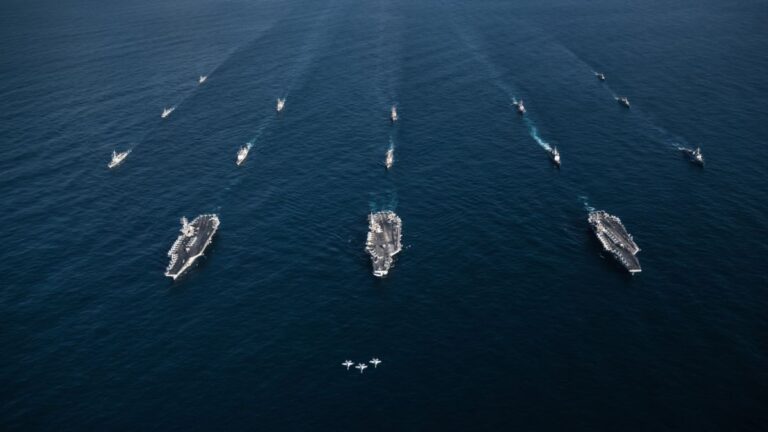Days of very high tension between China and the neighboring island of Taiwan. Relations between the two have never been smooth, indeed many have compared them to Russia and Ukraine.
The situation worsened first last August, after a visit to Taipei by Nancy Pelosi, then speaker of the U.S. House. “We will not stand idly by,” Beijing had thundered. Then, it became even more difficult after Taiwan President Tsai Ing-wen met with current U.S. House Speaker Kevin McCarthy in Los Angeles.
Table of Contents
The origins of the conflict between China and Taiwan
The reason is quickly stated. Taiwan has been de facto independent since 1949 but has always been claimed by China. Which in turn has accused Washington of violating its sovereignty.
So, Pelosi’s visit to Taiwan and then President Tsai Ing-wen’s visit to the U.S. is just the tip of the iceberg of a situation that has been explosive for years.
The reasons for which are to be sought in the past and are ideological, economic and cultural and related to Taiwan’s strategic position.
Taiwan, a strategic location in the Pacific
The island of Taiwan lies just a stone’s throw from Mainland China, from which it is separated by the so-called Taiwan Strait. It counts a population of 23 million people.
Its importance is first and foremost geographical. Historically, its location at the center between Northeast and Southeast Asia has served a variety of strategic purposes for regional powers, both offensive and defensive.
Why China wants Taiwan
For Beijing, the island represents the latest step on the road to “national rejuvenation“. Namely, the historic process initiated by the Party to overcome the century of great humiliations.
President Xi would like to see its reunification with mainland China by 2049, the centennial year of the birth of the People’s Republic of China.
The tension began in 1949, just after the end of the Chinese Civil War, which ended with the victory of the Communists led by Mao Zedong.
Who, proclaimed the People’s Republic, and the defeat of Chiang Kai-Shek’s Nationalists. Who, fled to the island of Taiwan with sufficient forces to deter Mao from continuing the conflict.
Since then, both entities have claimed to be the sole legitimate authority in all of China. But over the ensuing decades almost all of the international community has recognized Beijing’s government instead of Taiwan’s.
The historic tensions between China and the U.S. over Taiwan
Although not officially recognizing Taiwan, in 1979 the U.S. passed the Taiwan Relations Act, a pact that accords the island treatment essentially equal to any other state and establishes a strategic ambiguity.
Washington provides military aid to Taiwan and, while not officially pledging to defend it if it were attacked by the People’s China, does not say what it would do in such an eventuality. Which was reiterated, shortly before Pelosi’s visit, in talks between Chinese and U.S. Presidents Xi Jinping and Joe Biden.
Taiwan’s thriving economy, a leader in microchips
Taiwan is also very important economically. In fact, it is the 21st largest economy in the world and the home of semiconductor manufacturing, Tsmc being the champion.
Despite political and military tensions, Taipei’s exports to Beijing grew by 24.8 percent in 2021, reaching their all-time high. More than 42 percent of Taiwan’s exported goods went to the People’s Republic.
Not only that. Forty percent of world trade passes through the island, a quarter of which is U.S., with a total annual value of nearly $5.3 trillion.
How many states recognize Taiwan’s independence today
Taiwan is not recognized by either the People’s Republic of China or the other four permanent members of the UN Security Council. Namely, the United States, Russia, the United Kingdom, and France, as well as Canada and the other states of the European Union.
But, it maintains cooperative and trade relations with all of them. As of December 2021, it is recognized by 13 sovereign states worldwide in addition to the Holy See.
Can China really invade Taiwan?
According to some analysts, China has the power to take Taiwan. But it would cost it an extremely bloody price.
Indeed, China has more troops, more missiles and more ships than Taiwan or its possible backers, such as the United States or Japan.
This means that if China is absolutely determined to conquer the island, it can probably do so. But it could mean not inconsiderable carnage among civilians.
Read also: The 6 strongest military powers in the world today
What is happening between Taiwan and China today
As early as last August, Nancy Pelosi’s trip to Taiwan had produced at least two effects. First, it complicated the domestic agenda of PRC President Xi Jinping. And second, it laid the groundwork for a new crisis between Washington and Beijing in the Taiwan Strait.
On August 4, China kicked off its largest military exercises ever around the island with the launch of as many as 11 ballistic missiles. For Beijing, these were “necessary countermeasures.”
Taipei, for its part, deployed missile systems to track Chinese aviation activity, while its Navy ships remained in the area to monitor Beijing’s maneuvers.
A similar scenario unfolded on April 8, when Beijing launched a three-day military exercise in response to a meeting between President Tsai Ing-wen and current U.S. House Speaker McCarthy in Los Angeles.
And even after the drill ended on April 11, Taiwan’s Defense Ministry still detected a total of 26 military jets and nine Chinese warships around the Island.
It is such a worrying situation that Taiwan’s Foreign Minister Joseph Wu said, “It seems China is trying to prepare to launch a war. Chinese leaders will think twice before deciding to use force against Taiwan. And no matter whether in 2025 or 2027 or even beyond, Taiwan simply needs to prepare.”
Read also: The 6 countries possessing major nuclear weapons today












